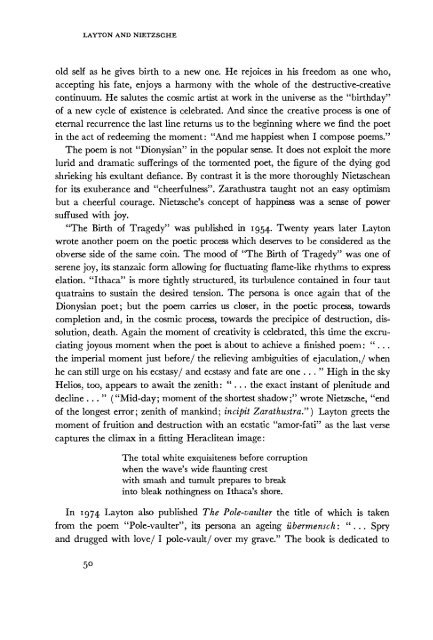LAYTON AND NIETZSCHE
LAYTON AND NIETZSCHE
LAYTON AND NIETZSCHE
You also want an ePaper? Increase the reach of your titles
YUMPU automatically turns print PDFs into web optimized ePapers that Google loves.
<strong>LAYTON</strong> <strong>AND</strong> <strong>NIETZSCHE</strong><br />
old self as he gives birth to a new one. He rejoices in his freedom as one who,<br />
accepting his fate, enjoys a harmony with the whole of the destructive-creative<br />
continuum. He salutes the cosmic artist at work in the universe as the "birthday"<br />
of a new cycle of existence is celebrated. And since the creative process is one of<br />
eternal recurrence the last line returns us to the beginning where we find the poet<br />
in the act of redeeming the moment: "And me happiest when I compose poems."<br />
The poem is not "Dionysian" in the popular sense. It does not exploit the more<br />
lurid and dramatic sufferings of the tormented poet, the figure of the dying god<br />
shrieking his exultant defiance. By contrast it is the more thoroughly Nietzschean<br />
for its exuberance and "cheerfulness". Zarathustra taught not an easy optimism<br />
but a cheerful courage. Nietzsche's concept of happiness was a sense of power<br />
suffused with joy.<br />
"The Birth of Tragedy" was published in 1954. Twenty years later Layton<br />
wrote another poem on the poetic process which deserves to be considered as the<br />
obverse side of the same coin. The mood of "The Birth of Tragedy" was one of<br />
serene joy, its stanzaic form allowing for fluctuating flame-like rhythms to express<br />
elation. "Ithaca" is more tightly structured, its turbulence contained in four taut<br />
quatrains to sustain the desired tension. The persona is once again that of the<br />
Dionysian poet; but the poem carries us closer, in the poetic process, towards<br />
completion and, in the cosmic process, towards the precipice of destruction, dissolution,<br />
death. Again the moment of creativity is celebrated, this time the excruciating<br />
joyous moment when the poet is about to achieve a finished poem : "...<br />
the imperial moment just before/ the relieving ambiguities of ejaculation,/ when<br />
he can still urge on his ecstasy/ and ecstasy and fate are one ..." High in the sky<br />
Helios, too, appears to await the zenith: "... the exact instant of plenitude and<br />
decline ..." ("Mid-day; moment of the shortest shadow;" wrote Nietzsche, "end<br />
of the longest error; zenith of mankind; incipit Zarathustra.'") Layton greets the<br />
moment of fruition and destruction with an ecstatic "amor-fati" as the last verse<br />
captures the climax in a fitting Heraclitean image :<br />
The total white exquisiteness before corruption<br />
when the wave's wide flaunting crest<br />
with smash and tumult prepares to break<br />
into bleak nothingness on Ithaca's shore.<br />
In 1974 Layton also published The Pole-vaulter the title of which is taken<br />
from the poem "Pole-vaulter", its persona an ageing Übermensch : "... Spry<br />
and drugged with love/ I pole-vault/ over my grave." The book is dedicated to<br />
50

















